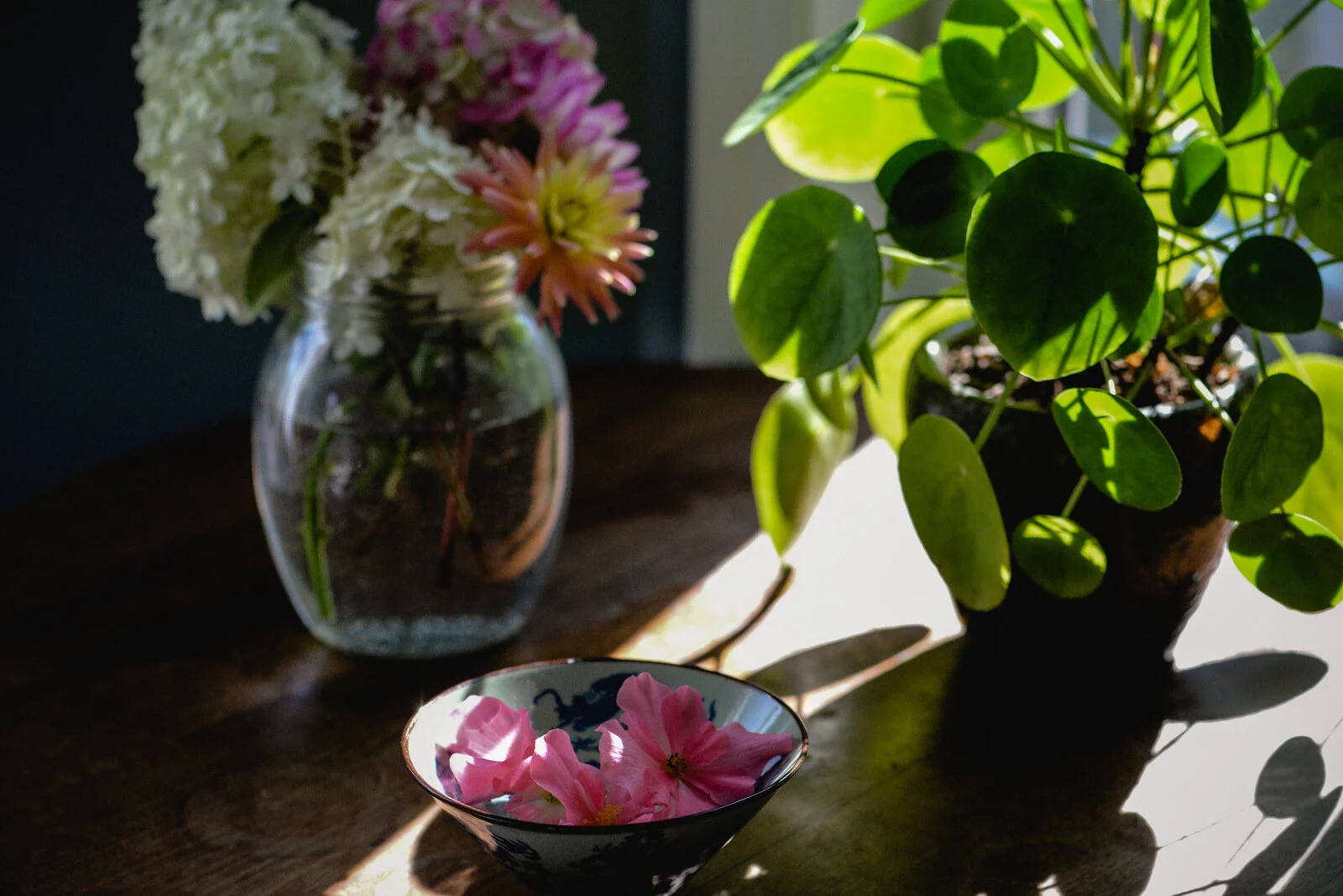The Table in the Dark
I’m quite fond of the table in the photographs you see here. It’s maybe a strange thing of which to be fond – an old scratched up table with the requisite paint stains from having lived part of its life in the painter’s studio downstairs. When I first got my present camera, I practiced by taking photos of the table itself. It’s an old table, the kind that pops into two pieces for storage, though we always have it out. It’s on a bit of a perpetual slant because of its design I suppose. We bought most of our furniture secondhand and that was 25 years ago, so almost everything in our house sags or slants or dips or has chips in it or tears or is frayed. I mean, I think this is preferable to ordering a home out of a design magazine, isn’t it?
So let’s talk about tables, the table as such.
From Clarice Lispector’s most recently translated work, The Besieged City:
“And to be enthralled: because behold the table in the dark. Raised above itself by its lack of function. The other things of the room engorged by their own existence, whereas anything that at least wasn’t solid, like the small hollow three-legged table – didn’t have, didn’t give – was transitory – surprising – perched – extreme.”
“The secret of things was in that, by showing themselves, they showed themselves exactly as they were.”
In Looking at the Overlooked by Norman Bryson, one of the first extensive academic studies of still life, he says:
“Still life of the table is deeply concerned with the issue of tactility because it is the hand and not only the eye which organizes its spaces, and the touch of hands in the everyday gestures of eating and drinking which confers upon its objects their human warmth and resonance.”
Piled up with treasures and valuables the table itself, Bryson says, becomes like a “bank-vault” or a “graveyard.” But really, in a still life, who every really notices the table? The whole magic trick of still life is that we forget who put the stuff on the table, and how it was arranged and composed, and we don’t think about the table either, the sturdy surface holding up the objects. We might take note of the light and shadows falling upon the table, but we usually take the surface for granted. Of course, there is Neruda’s poem:
Ode to the Table
by Pablo Neruda
I work out my odes
on a four-legged table
laying before me bread and wine
and roast meat
(that black boat
of our dreams)
Sometimes I set out scissors, cups and nails,
hammers and carnations.
Tables are trustworthy:
titanic quadrupeds
they sustain
our hopes and our daily life.
The rich man’s table,
scrolled and shining
is
a fabulous ship
bearing bunches of fruit.
Gluttony’s table is a wonder
piled high with Gothic lobsters
and there is also a lonesome
table in our aunt’s dining room,
in summer. They’ve closed
the curtains,
and a single ray of summer light
strikes like a sword
upon this table sitting in the dark
and greets the plums’ transparent peace.
And there is a faraway table, a humble table,
where they’re weaving
a wreath
for
a dead miner.
That table gives off the chilling odor
of a man’s wasted pain.
There’s a table
in a shadowy room nearby
that love sets ablaze with its flames.
A woman’s glove was left behind there,
trembling like a husk of fire.
The world is a table
engulfed in honey and smoke
smothered by apples and blood.
The table is already set,
and we know the truth
as soon as we are called:
whether we’re called to war or to dinner
we will have to choose sides,
have to know
how we’ll dress
to sit
at the long table,
whether we’ll wear the pants of hate
or the shirt of love, freshly laundered.
It’s time to decide,
they’re calling:
boys and girls,
let’s eat!
The poem by Joy Harjo only becomes more important.
Perhaps the World Ends Here
by Joy Harjo
The world begins at a kitchen table. No matter what, we must eat to live.
The gifts of earth are brought and prepared, set on the table. So it has been since creation, and it will go on.
We chase chickens or dogs away from it. Babies teethe at the corners. They scrape their knees under it.
It is here that children are given instructions on what it means to be human. We make men at it, we make women.
At this table we gossip, recall enemies and the ghosts of lovers.
Our dreams drink coffee with us as they put their arms around our children. They laugh with us at our poor falling-down selves and as we put ourselves back together once again at the table.
This table has been a house in the rain, an umbrella in the sun.
Wars have begun and ended at this table. It is a place to hide in the shadow of terror. A place to celebrate the terrible victory.
We have given birth on this table, and have prepared our parents for burial here.
At this table we sing with joy, with sorrow. We pray of suffering and remorse. We give thanks.
Perhaps the world will end at the kitchen table, while we are laughing and crying, eating of the last sweet bite.
{source}
Who is invited to the table? What will you put upon it? Who will feel welcome? Who will bring love? Who will talk loudly and who will speak quietly and with assurance? How will we become more human and teach those we love to be more human at this table? With whom will we share and how much? How fulsomely will we give thanks?







